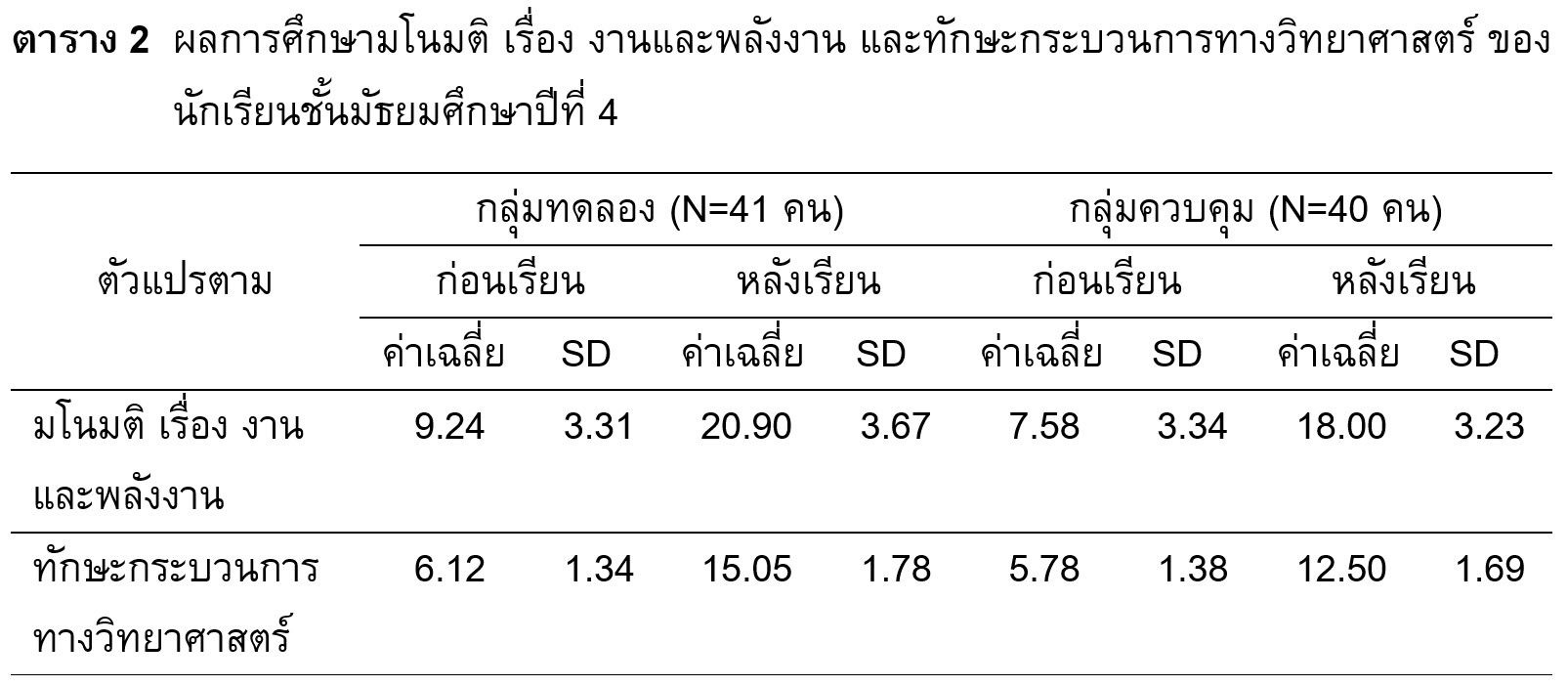การเปรียบเทียบมโนมติ เรื่อง งานและพลังงาน และทักษะกระบวนการทางวิทยาศาสตร์ของนักเรียนชั้นมัธยมศึกษาปีที่ 4 ที่เรียนด้วยวัฏจักรการเรียนรู้ 7 ขั้นเสริมด้วยชุดกิจกรรมวิทยาศาสตร์กับการเรียนแบบปกติ
Main Article Content
Abstract
Onwadee Sreebua, Varanya Jeeravipoolvarn and Pattawan Narjaikaew
รับบทความ: 27 มิถุนายน 2558; ยอมรับตีพิมพ์: 18 ตุลาคม 2558
บทคัดย่อ
การวิจัยครั้งนี้มีวัตถุประสงค์เพื่อศึกษาและเปรียบเทียบมโนมติ เรื่อง งานและพลังงาน และทักษะกระบวนการทางวิทยาศาสตร์ของนักเรียนชั้นมัธยมศึกษาปีที่ 4 ระหว่างก่อนเรียนและหลังเรียนด้วยการเรียนแบบวัฏจักรการเรียนรู้ 7 ขั้นเสริมด้วยชุดกิจกรรมวิทยาศาสตร์ กับการเรียนแบบปกติ ดำเนินการวิจัยโดยใช้แบบแผนการวิจัยเชิงกึ่งทดลอง มีรูปแบบการทดลองแบบกลุ่มทดลองและกลุ่มควบคุม วัดผลก่อนและหลังการทดลอง กลุ่มตัวอย่างที่ใช้ในการวิจัยเป็นนักเรียนชั้นมัธยมศึกษาปีที่ 4 ภาคเรียนที่ 2 ปีการศึกษา 2557 โรงเรียนคำม่วง อำเภอคำม่วง จังหวัดกาฬสินธุ์ จำนวน 2 ห้องเรียน จำนวนนักเรียน 91 คน โดยวิธีการเลือกตัวอย่างแบบกลุ่ม จำนวน 2 ห้องเรียน จากนั้นสุ่มเข้ากลุ่มทดลองและกลุ่มควบคุม โดยใช้วิธีจับฉลากเป็นกลุ่มห้อง โดยกลุ่มทดลองได้รับการเรียนแบบวัฏจักรการเรียนรู้ 7 ขั้นเสริมด้วยชุดกิจกรรมวิทยาศาสตร์ และกลุ่มควบคุมได้รับการเรียนแบบปกติ เครื่องมือที่ใช้ในการวิจัยประกอบด้วยแผนการจัดการเรียนรู้แบบวัฏจักรการเรียนรู้ 7 ขั้นเสริมด้วยชุดกิจกรรมวิทยาศาสตร์ แผนการจัดการเรียนรู้แบบปกติ แบบวัดมโนมติ 2 ระดับประกอบด้วยแบบวัดปรนัยชนิด 4 ตัวเลือกและการเขียนแสดงเหตุผลประกอบคำตอบ และแบบทดสอบวัดทักษะกระบวนการทางวิทยาศาสตร์ การวิเคราะห์ข้อมูลใช้ค่าเฉลี่ย ค่าร้อยละ ค่าส่วนเบี่ยงเบนมาตรฐาน การทดสอบทีแบบแบบกลุ่มศึกษาเป็นอิสระต่อกันและไม่เป็นอิสระต่อกัน และการวิเคราะห์ความแปรปรวนหลายปัจจัยทางเดียว ผลการ ศึกษา พบว่า 1) ด้านมโนมติเรื่อง งานและพลังงาน นักเรียนที่ได้รับการเรียนแบบวัฏจักรการเรียนรู้ 7 ขั้น เสริมด้วยชุดกิจกรรมวิทยาศาสตร์ มีคะแนนเฉลี่ยก่อนเรียนเท่ากับ 9.24 คะแนน (ร้อยละ 30.80) และคะแนนเฉลี่ยหลังเรียนเท่ากับ 20.90 คะแนน (ร้อยละ 69.67) และนักเรียนที่ได้รับการเรียนแบบปกติมีคะแนนเฉลี่ยก่อนเรียนเท่ากับ 7.58 คะแนน (ร้อยละ 25.27) คะแนนเฉลี่ยหลังเรียนเท่ากับ 18.00 คะแนน (ร้อยละ 60.00) ซึ่งนักเรียนทั้ง 2 กลุ่มมีคะแนนเฉลี่ยหลังเรียนสูงกว่าก่อนเรียน 2) ด้านทักษะกระบวนการทางวิทยาศาสตร์ นักเรียนที่ได้รับการเรียนรู้แบบวัฏจักรการเรียนรู้ 7 ขั้นเสริมด้วยชุดกิจกรรมวิทยาศาสตร์ มีคะแนนเฉลี่ยก่อนเรียนเท่ากับ 6.12 คะแนน (ร้อยละ 30.60) และคะแนนเฉลี่ยหลังเรียนเท่ากับ 15.05 คะแนน (ร้อยละ 75.25) ส่วนนักเรียนที่ได้รับการเรียนแบบปกติมีคะแนนเฉลี่ยก่อนเรียนเท่ากับ 5.78 คะแนน (ร้อยละ 28.90) และคะแนนเฉลี่ยหลังเรียนเท่ากับ 12.50 คะแนน (ร้อยละ 62.50) ซึ่งนักเรียนทั้ง 2 กลุ่มมีคะแนนเฉลี่ยหลังเรียนสูงกว่าก่อนเรียน 3) นักเรียนที่ได้รับการเรียนรู้แบบวัฏจักรการเรียนรู้ 7 ขั้นเสริมด้วยชุดกิจกรรมวิทยาศาสตร์มีมโนมติเรื่อง งานและพลังงาน และทักษะกระบวนการทางวิทยาศาสตร์หลังเรียนสูงกว่านักเรียนที่เรียนแบบปกติ
คำสำคัญ: มโนมติเรื่องงานและพลังงาน ทักษะกระบวนการทางวิทยาศาสตร์ วัฏจักรการเรียนรู้ 7 ขั้นเสริมด้วยชุดกิจกรรมวิทยาศาสตร์
Abstract
The purposes of this research were to study and compare of work and energy concepts and science process skills of Grade-10 students who learned by using the 7ES learning circle supplemented with science activity kits and traditional teaching method. The research design were quasi-experimental research, non-equivalent control group, and pretest-posttest design. The subjects were 91 Grade-10 students in the second semester of the academic year 2014 at Khammung School, Khammung, Kalasin. The two classrooms were selected by cluster random sampling, and then the samples were divided into the experimental groups and the control groups by a lottery method. The research instruments included the lesson plans based on the 7ES learning circle supplemented with science activity kits, the lesson plans based on the traditional teaching method, a two-tier diagnostic test, and a science process skills test. The data were analyzed by using the mean score, percentage, standard deviation, t-test for dependent and independent samples, and one-way MANOVA. The research results were as follows: 1) The concepts of work and energy of students’ mean scores before and after using 7ES learning circle supplemented with science activity kits were 9.24 (30.80%) and 20.90 (69.67%), respectively. The concepts of Work and Energy of students’ mean scores before and after using traditional learning 7.58 (25.27%) and 18.00 (60.00%), respectively. The posttest mean scores were significantly higher than the pretest in both cases. 2) The science process skills of students’ mean scores before and after using 7ES learning circle supplemented with science activity kits were 6.12 (30.60%) and 15.05 (75.25%), respectively. The science process skills of students’ mean scores before and after using the traditional learning were 5.78 (28.98%) and 12.5 (62.50%), respectively. The posttest mean scores were significantly higher than the pretest in both cases. 3) Students who participated through 7ES learning circle supplemented with science activity kits had the posttest mean scores of work and energy concepts and science process skills significantly higher than students who participated in the traditional learning method.
Keywords: Work and energy concepts, Science process skills, 7ES learning circle supplemented with science activities
Downloads
Article Details

This work is licensed under a Creative Commons Attribution-NonCommercial 4.0 International License.
References
Bureau of Academic Affairs and Educational Standards. (2014). Learning Activities with Scientific Inquiry. Bangkok: Aksornthai. (in Thai)
Griffiths, A. K., and Preston, K. R. (1992). Grade-12 students’ misconceptions relating to fundamental characteristics of atoms and molecules. Journal of Research in Science Teaching 29(6): 611–628.
Hewson, P. W., and Hewson, M. G. A’B. (1988). An appropriate conception of teaching science: A view from studies of science learning. Science Education 72(5): 597–614.
Kanli, U. (2007). The effects of a laboratory based on the 7E model with verification laboratory approach on students’ develop-ment of science process skills and conceptual achievement. Doctor of philosophy in Physics Teaching. Turkey: Gazi University.
Marek, F. A, Eubanks, C., and Gallagher, T. H. (1990). Teacher’s understanding and the use of the learning cycle. Journal of Research in Science Teachers 27: 821–834.
Naluan, N., Na Phatthalung, N., and Kattiyamarn, W. (2013). The results of 7E learning cycle model with questioning technique on analysis thinking abilities and scientific learning achievement of prathomsuksa 5 students. Hatyai Symposium 2013, Hatyai, Thailand. (in Thai)
Nuangchalerm, P. (2007). 7E Learning cycles. Academic Journal 10(4): 25–29. (in Thai)
Odom, A. L., and Kelly, P. V. (2001). Integrating concept mapping and the learning cycle to teach Diffusion and Osmosis concepts to high school biology students. Science Education 85: 615–635.
Phornphisutthimas, S. (2013). Learning management of science in 21st century. Journal of Research Unit on Science, Technology and Environment for Learning 4(1): 55–63. (in Thai).
Phornphisutthimas, S. (2008). Teaching science underlining process skills. Advanced Science Journal 8(2):28–38. (in Thai)
Suksringam, P. (2002). Understanding of Inquiry Approach. Mahasarakham: Faculty of Science. Mahasarakham University. (in Thai).
Yadav, B., and Mishra, S. K. (2013). A study of the impact of laboratory approach on achievement and process skills in science among is standard students. International Journal of Scientific and Research Publications 3(1): 1–6.
